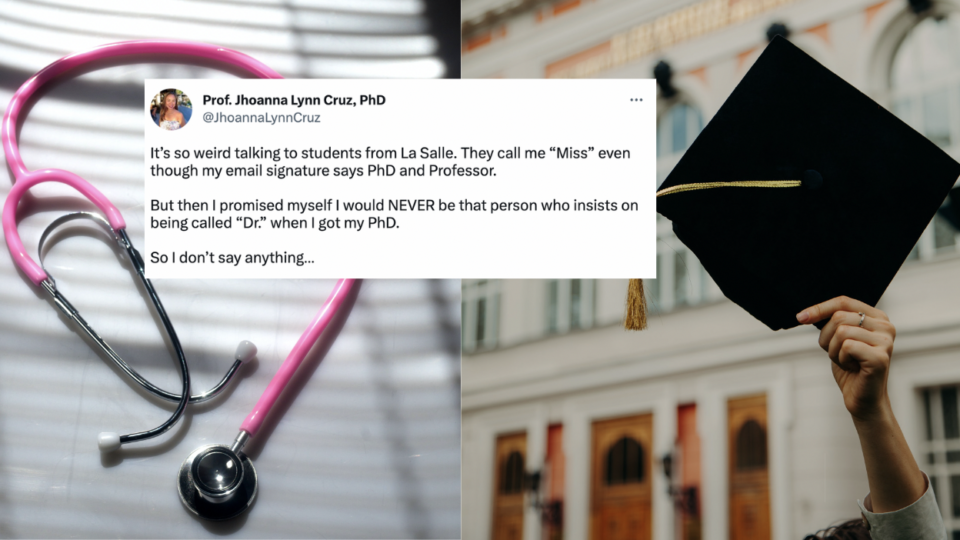A tweet by an academic who admitted feeling hurt over not being addressed as “Dr.” by her students despite possessing a doctorate degree has sparked a discussion over the place of titles in social situations.
Literature professor Jhoanna Lynn Cruz sparked online wildfire after posting a series of tweets in which she detailed her discomfort being addressed by students of De La Salle University, a private institution in Manila, as “Miss” instead of “Dr.”
“It’s so weird talking to students from La Salle. They call me ‘Miss’ even though my email signature says PhD and Professor,” she wrote. “But then I promised myself I would NEVER be that person who insists on being called ‘Dr.’ when I got my PhD. So I don’t say anything.”
Cruz then added she felt she deserved to be called the title after going through a rigorous PhD program and had to “fight with [her] life” to earn a full professor title at the University of the Philippines.
“Guys, it HURTS to be called ‘Miss,’” she concluded.
She did clarify that she only expected to be called “Dr.” by her students and colleagues in academia, and she was fine being addressed by her first name “under normal circumstances.”
The tweet earned controversy, particularly among students of the university who argued that it was the culture in La Salle to address faculty members as “Miss” or “Sir” by default unless informed otherwise.
“Apologies. We’re just used to calling our teachers ‘miss’ out of respect. It’s a school practice. I’m aware of the bias against women with titles, but I think your students have no intentions of demeaning your academic achievements. It’s just a spillover of La Salle culture,” user ptrckmanzao explained.
Some sided with Cruz, saying that mistitling women was common practice in the academic world to demean their expertise.
Others said that all she simply had to do was to inform her students about her preference as they meant no malice.
Meanwhile, others argued that there was no need to get so pressed over titles and that respect can be given even when one is addressed by their first names.
“So many thoughts on this pero would your PhD/MD/JD and etc. [be diminished] when students refer to you as Ma’am/Sir/Miss? I get it, we work hard for the degree and we’d like that recognized. Been scrolling through this thread and trying to make sense out of it,” user psycyduck wrote.
“My [UP Diliman professors] got their masters and/or doctorates from prestigious schools here or abroad, pero many of them demand us to call them by their nicknames. In most circumstances, they would be the first to discourage us from calling them prof/miss/ma’am/sir/doc wth u on gurlie,” alxjsndro said.
“I’ve been called ‘kuya, sir, nurse, and manong’ numerous times in the hospital by the patient’s relative and it’s no big deal. Except if you’re the type of person who pushed higher studies just for the title,” kelvirata chimed in.
“One of the perks of working here in Europe is you don’t have to trouble yourself that much with titles. I call my bosses by their first names, and I address customers casually. They don’t have any issue with it,” azzurriskies said.
However, one said that it was both valid to acknowledge the use of honorifics and the misogyny women in academia and professional settings face.
“I hate using honorifics cause of its elitist undertones but it’s weird how the first response of people to this tweet is discredit a woman in academia and mock her. Women are underrepresented and taken less seriously in academia because of misogyny… They need to work 10 times harder to prove themselves worthy of the same respect as their male peers… We can call out how weird the assertion of titles are without the misogynistic undertones,” arsenicangels said.




